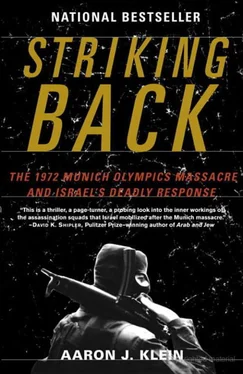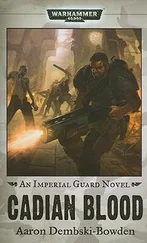At 2235 hours the couple left the movie theater and walked in silence to the bus stop. Harari sent the two assassins to Porobakakan Street, where they waited in darkness next to one of the houses. The bus arrived at the stop and the couple boarded without hesitation. The surveillance team followed. The couple got off the bus, calm and relaxed. They held hands, talking quietly to each other as they strolled along Porobakakan Street, walking leisurely up the inclining street toward their house. A car coming in the opposite direction stopped several yards away. The two men in the backseat jumped out, withdrew their silenced Berettas, and shot the man ten times at close range. They stepped back into the car and sped off down the hill.
The bullets had torn through the man’s vital organs. The woman knelt down next to him, screaming wildly. A neighbor, a young nurse named Dagny Bring, looked out of her window and called the police. Within three minutes, a police car arrived. Ten minutes later, an ambulance arrived; attempts at resuscitation failed. Fifteen minutes after arriving at the local hospital, the man was pronounced dead.
According to the original plan, Harari and the two assassins were to leave Lillehammer separately, then travel south to Oslo as fast as possible; by the early morning hours they would be scattered in different countries throughout Europe. The members of the surveillance team also headed for Oslo. There, they were supposed to return the rental cars, turn over the keys to the rented apartments they had used during the operation, and sweep, making sure that no “tails” or footprints had been left behind. They were to wait a few days and then get out of Oslo.
Early in the morning, R., Caesarea’s chief intelligence officer, called his colleague in Branch 4, a talented young captain from the Targets section, and revealed, “We took him out. We got Salameh, in Norway.”
“What? That’s impossible!”
“I’m telling you, we got him,” R. insisted.
“But it can’t be,” the officer shouted, slamming his fist down hard on the desk. “He wasn’t there. It’s a mistake!”
When the head of Branch 4 debriefed his officers about the amazing assassination in Norway, the officers, appalled, said, “It can’t be, he wasn’t there.”
In Monday’s Norwegian newspapers, giant headlines announced the murder of a young Moroccan by the name of Achmed Bouchiki, killed in Lillehammer on Saturday night. Caesarea officers suspected that the name was just another one of the cover identities Ali Hassan Salameh used while traveling abroad. But they were terribly wrong; they had made an awful mistake. Caesarea’s assassination team had trailed and murdered the wrong man.
A reporter and photographer had rushed to the scene right after the murder. Interviews with eyewitnesses and neighbors revealed the presence of strangers in fancy cars, Mercedes and Mazdas, driving around the neighborhood, pausing in front of the apartment building earlier that day. The reporter knew he had a major story: this was the first murder in Lillehammer in forty years. He had no idea what he really had.
The reporter knew Bouchiki from around town. In a two-page article he described the man as a thirty-year-old Moroccan who had lived in Lillehammer for the past four years. His wife, Toril Larsen Bouchiki, was Norwegian. She was in her seventh month of pregnancy. Bouchiki, the article noted, had emigrated from Morocco in the hope of improving his life. He worked as a waiter, and supplemented his salary with a part-time job at the local pool. Years later it became clear that the meeting with Kamal Benaman on the balcony of the Karoline Café was an innocent get-together between two North Africans, a chance to speak a few words of Arabic and catch up on news from home.
Oslo papers raised the possibility of a connection between the arraignment of four foreigners with foreign passports—Patricia Roxburgh, Leslie Orbaum, Marianne Gladnikoff, and Dan Art—and the shooting in Lillehammer. The initial reports were unclear, unable to explain how the four detainees were connected to the murdered man. Some raised the possibility that it was a drug deal gone wrong.
On Sunday morning, Dan Art, an Israeli of Danish origin who went by the name Dan Arbel in Israel, was taken into custody. He was using his real passport while fulfilling an auxiliary role in the Mossad mission. He was recruited for this mission at the last minute, brought on board because of his command of the language, a skill the Caesarea combatants lacked. He could read the street signs, verify addresses over the telephone, order hotel rooms, rent cars, and find suitable safe houses. Marianne Gladnikoff, a Swedish Jew who had been picked by Caesarea’s human resources division shortly after she moved to Israel—and had been suggested as a suitable candidate for support and logistical operations in Scandinavian countries—was arrested along with Art/Arbel. The two were stopped at the Pornavo Airport returning the team’s rental cars. They had no cover story prepared and failed to explain why they were driving cars with plates the police were looking for (the two cars had been spotted at a roadblock speeding out of Lillehammer—and struck an officer as suspicious). Neither of the two was a Mossad combatant. They talked as soon as they were taken in for questioning. The information they provided led to the arrest of two senior members of the surveillance unit. The veteran agents were traveling undercover as British citizen Leslie Orbaum and Canadian citizen Patricia Roxburgh.
Leslie Orbaum was none other than Avraham Gemer, staff officer and head of the unit. He was a tough and stubborn man who did not cooperate with the investigators and stuck to his hole-ridden cover story, that he was British citizen Orbaum, aged twenty-nine, a teacher and librarian from Leeds, vacationing in Norway.
“Your name can’t be Leslie Orbaum,” the police investigator charged. “This man doesn’t exist. We checked thoroughly.”
“So I don’t have a name,” Gemer answered angrily.
Patricia Roxburgh, the woman taken into custody, was actually Sylvia Rafael. She was a Caesarea combatant who had participated in numerous operations in Europe, Lebanon, Syria, and Egypt. An attractive thirty-six-year-old Jew, Rafael was born in Capetown, South Africa. She was an amateur photographer. In 1963, she arrived in Israel; by 1965, she had been recruited by Caesarea’s human resources department. Her skills as a combatant were evident from the start. She was calm, quick-witted, and trustworthy. She was the type of woman who could mingle in any society and engender a feeling of security and trust. Rafael preferred to keep her independence, though: she did not join the Mossad full-time, choosing to participate only in certain missions. Caesarea kept her close at hand and requested her services often. Her hobby had served her well on numerous occasions. Using a Canadian or South African passport, she presented herself as a freelance reporter and photographer scouring the area for a juicy story.
Rafael claimed to be a Canadian freelance journalist on vacation who happened to meet Leslie Orbaum, an old acquaintance, by chance, at the Zurich airport. On the spot the two decided to travel to Norway for a vacation. There they met Art/Arbel and Gladnikoff and decided to share an apartment with them.
The investigators were not convinced. There were serious contradictions in the four versions of events the detainees recounted. They could not corroborate the details of the time they lived together.
When the Oslo police searched Dan Art’s belongings they found documents with a phone number that led to the arrest of two additional Israelis, Zvi Steinberg and Michael Dorf, who were staying in the private residence of Yigal Eyal, security officer for the Israeli embassy in Oslo. The two men were logistics and communications agents for the Mossad. They had found temporary shelter in the security officer’s apartment. In Steinberg’s coat pocket, the police found a first-class train ticket from Oslo to Copenhagen, set to leave at 2210 hours that night. As they searched through Steinberg’s and Dorf’s suitcases and personal items, more incriminating evidence was discovered. The Caesarea agents had been negligent during the final stages of the operation. With Dorf and Steinberg arrested, the number of detained Israelis rose to six.
Читать дальше












